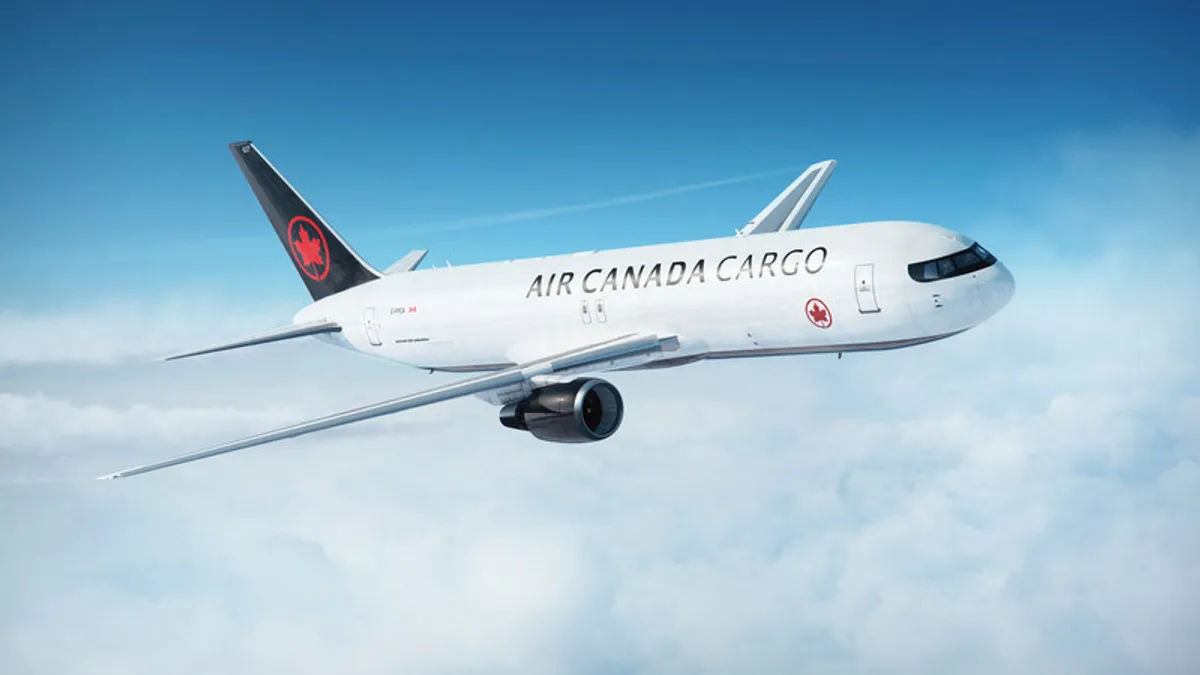Dive Brief:
- Air Canada plans to add three dedicated freighters to its fleet in 2022 as the airline looks to diversify its revenue streams in the face of lower passenger demand, Executive Vice President and Chief Commercial Officer Lucie Guillemette said on a Feb. 18 earnings call.
- Air Canada saw record cargo revenues last year, aided by the temporary conversion of passenger aircraft to all-cargo configurations, per its Q4 results. Now it's adding permanent cargo-only flights — it introduced its first Boeing 767 freighter in December, the first of eight aircraft that will eventually make up its freighter fleet.
- "The sustained performance of Air Canada Cargo will validate our decision to return to fully dedicated cargo aircraft to take advantage of the growing cargo market both in dedicated belly space and freighters," Guillemette said. "Cargo business is an important part of our recovery and long-term growth, helping with seasonality and diversification."
Air Canada builds cargo revenues as passenger travel plummets
Dive Insight:
The COVID-19 pandemic cratered air travel demand, and airlines are still struggling to climb back to their pre-pandemic passenger activity levels. Cargo operations, meanwhile, have been a bright spot for the industry — United Airlines and American Airlines both reported record revenues in the segment on recent earnings calls.
Strong cargo performance holds true for Air Canada, as well. The airline operated 10,217 cargo-only flights in 2021, more than double the 4,235 it operated the year before, according to its financial results. Passenger travel remains Air Canada's larger source of revenue, but YoY passenger revenue growth (3%) was easily outpaced by its cargo business (63%) in 2021.
The use of converted passenger aircraft, which have seats removed from the passenger cabin to free up cargo space, buoyed these results. Air Canada plans to have all converted aircraft back in passenger configuration by the end of 2022, Executive Vice President and CFO Amos Kazzaz said on the call.
However, the airline still expects to benefit from increased air cargo demand through the use of its new dedicated freighters. Air Canada is also investing $16 million to bolster its cold chain handling capabilities at its Toronto Pearson International Airport cargo facility, according to a news release.
"The project is part of Air Canada's strategy to further develop its cargo division, which also includes the introduction of additional freighter aircraft, the launch of dedicated freighter routes and an expansion into the e-commerce delivery service," the release said.
Several carriers beyond Air Canada are expanding their freighter fleets to capitalize on newfound demand. CMA CGM Group recently agreed to purchase four freighter aircraft from Airbus, while DHL announced the order of nine converted freighters from Boeing in November.
"With sustained demand for air cargo tied to expanding e-commerce and air freight's speed and reliability, we project the global freighter fleet in 2040 will be 70% larger than the pre-pandemic fleet," Boeing President and CEO David Calhoun said on an October earnings call.













